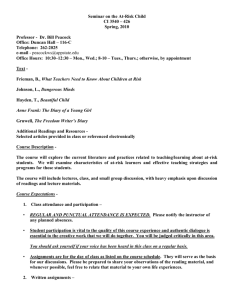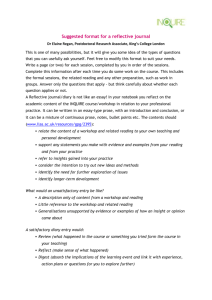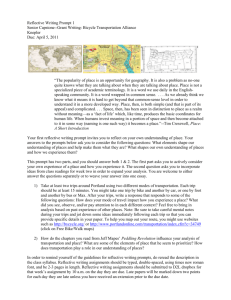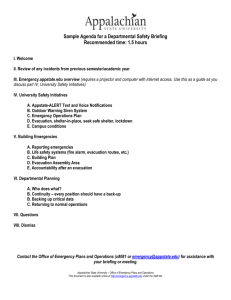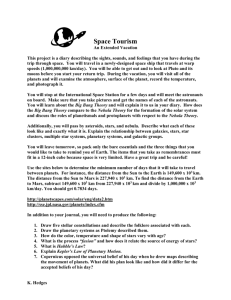CI3540425111 - Syllabi - Appalachian State University
advertisement
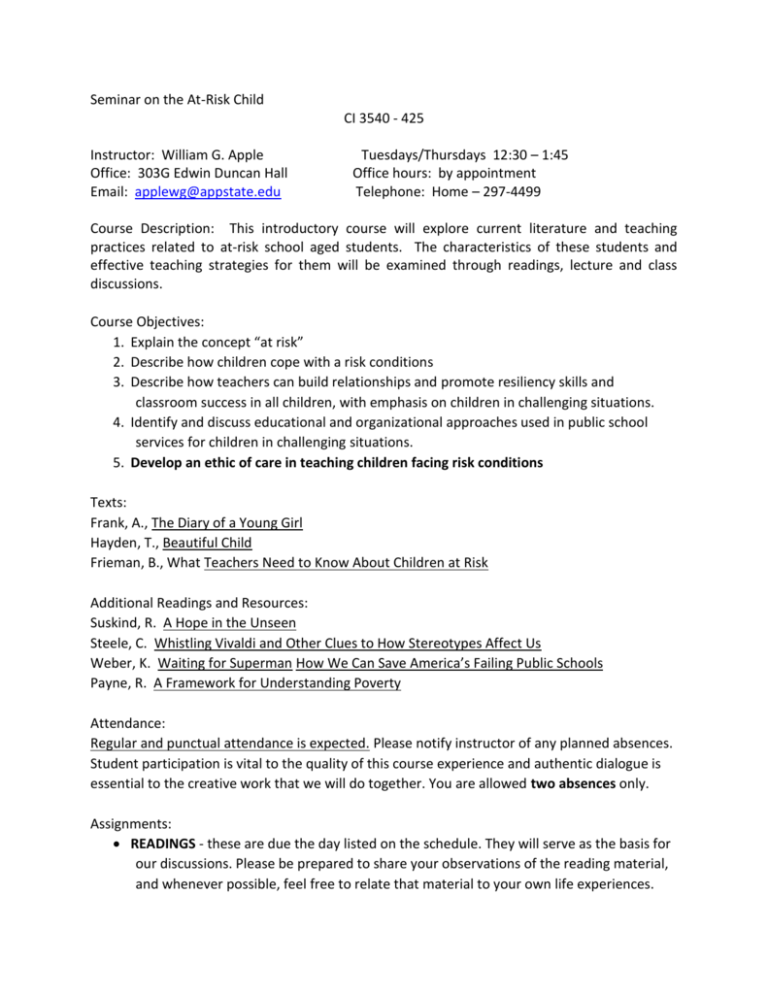
Seminar on the At-Risk Child CI 3540 - 425 Instructor: William G. Apple Office: 303G Edwin Duncan Hall Email: applewg@appstate.edu Tuesdays/Thursdays 12:30 – 1:45 Office hours: by appointment Telephone: Home – 297-4499 Course Description: This introductory course will explore current literature and teaching practices related to at-risk school aged students. The characteristics of these students and effective teaching strategies for them will be examined through readings, lecture and class discussions. Course Objectives: 1. Explain the concept “at risk” 2. Describe how children cope with a risk conditions 3. Describe how teachers can build relationships and promote resiliency skills and classroom success in all children, with emphasis on children in challenging situations. 4. Identify and discuss educational and organizational approaches used in public school services for children in challenging situations. 5. Develop an ethic of care in teaching children facing risk conditions Texts: Frank, A., The Diary of a Young Girl Hayden, T., Beautiful Child Frieman, B., What Teachers Need to Know About Children at Risk Additional Readings and Resources: Suskind, R. A Hope in the Unseen Steele, C. Whistling Vivaldi and Other Clues to How Stereotypes Affect Us Weber, K. Waiting for Superman How We Can Save America’s Failing Public Schools Payne, R. A Framework for Understanding Poverty Attendance: Regular and punctual attendance is expected. Please notify instructor of any planned absences. Student participation is vital to the quality of this course experience and authentic dialogue is essential to the creative work that we will do together. You are allowed two absences only. Assignments: READINGS - these are due the day listed on the schedule. They will serve as the basis for our discussions. Please be prepared to share your observations of the reading material, and whenever possible, feel free to relate that material to your own life experiences. JOURNALS - You will keep an electronic journal. The journal will be submitted periodically by e mail throughout the semester so that I can respond to your reflections related to aspects of our course work. Your journal speaks to the degree to which you become involved in this course experience. What you say is up to you, but you should have something to say about every class assignment. D.C. TRIP – You will be asked to do outside research in preparation for your D.C. trip and report on your findings. You will also be responsible for developing a set of relevant questions in anticipation of the trip experience. Finally, you will be required to provide written/visual reflection of that experience upon return presentation. A check sheet will be provided of critical elements to include. REFLECTIVE SUMMARY PAPERS – You will be asked to provide written reflections via email related to the text materials used in this course. Your reflections should include connections to teaching and learning within the context of our discussions. Papers should be 1 – 3 pages in length. See reflection rubric. COLLABORATIVE REASONING DISCUSSIONS – Find and read articles from reputable outside sources that deal with an issue related to the questions assigned to your group. Use index cards and note 4 points from your articles that affirm or deny the suggestion posed by the question. Bring your articles and your notes to class on the date of your assigned group discussion. (See 2/1 below) GRADING - Attendance and class participation: 35% Reflective Summary written assignments – 5 papers: 50% Individual/Group Presentations: 15% NOTE – OUR SYLLABUS IS A “LIVING” DOCUMENT. IT ALMOST SURELY WILL CHANGE AS THE SEMESTER EVOLVES. BE PATIENT AND FLEXIBLE! Tentative Schedule: 1/11 Introductions and discussion of the syllabus. What makes a student at risk? In class: write about someone you know who is “at-risk”. For next class, ask three people who are not involved in education what “at risk” and “resilience” means and do the same for three people who are not in education. Is there a difference? 1/13 What is resilience? Read: http://www.ericdigests.org/1998-1/risk.htm What is a “turnaround teacher”? Read: http://www.ericdigests.org/1996-2/fostering.html. Form groups for class presentation assignments related to Frieman’s Children At Risk. Groups to be assigned: 1) Risk and Resiliency; 2) Psychological Conditions; 3) Physiological Conditions; and 4) Social Conditions 1/18 Write in your journal: “What are my risk factors?” and how have I overcome them? In what ways have I developed or shown resilience? Consider the three “protective factors or processes”. Class presentations 1 & 2 and discussion. 1/20 Class presentations 3 & 4 and discussion. Assign groups for “Collaborative Reasoning Discussion” Group#1 for 2/1: “Can schools and school policies be sources of risk?” Group #2 for 2/3: “Are Charter Schools ‘Better Than’ Regular Schools?” Group #3 for 2/8: “Should boys be treated differently?” Group #4 for 2/10 “Do SES and/or race stereotypes influence students becoming at risk?” 1/25 DVD Freedom Writers’ Diary 1/27 DVD Freedom Writers’ Diary. Summary discussion of Freedom Writers’ Diary Reflective Summary due on 1/30 via email: applewg@appstate.edu 2/1 Collaborative Reasoning Discussion – Group #1. Read: Hayden,Chapters 1 - 8 2/3 Collaborative Reasoning Discussion – Group #2. Read: Hayden Chapters 9-17 2/8 Collaborative Reasoning Discussion – Group #3. Read: Hayden Chapters 18-24 2/10 Collaborative Reasoning Discussion – Group #4 Read: Hayden,Chapters 25-35 2/15 Summary discussion of Beautiful Child. Reflective Summary due on 2/20 via Email: applewg@appstate.edu DVD “Inside the Teenage Brain”. 2/17 Read: Diary of Anne Frank 2/22 Read: Diary of Anne Frank pages 141 – 283 Summary discussion of Anne Frank. Reflective Summary due on 2/27 via email: applewg@appstate.edu 2/24 Read: A Hope in the Unseen Chapters 1 - 6 3/1 Read: A Hope in the Unseen Chapters 7 - 14 3/3 Stereotypes and the at risk student 3/15 DVD Bang, Bang, You’re Dead pages 1 – 140 3/17 DVD Bang, Bang, You’re Dead. Summary discussion of Bang, Bang, You’re Dead. Reflective Summary due on 3/20 via email: applewg@appstate.edu 3/22 Field Trip? 3/24 Meet in the computer lab. Review D.C. school web sites and make notes regarding school facilities, the curriculum, expectations of student behavior and academic performance etc. Develop 5 – 10 questions that you would like to ask teachers, students or school administrators at the D.C. schools. Consider the question: “Why is this D.C. school visit a focus of CI 3540?” 3/29 Poverty and at risk students 3/30 – 4/1 D.C. Trip 4/5 D.C. Trip reflections 4/7 Boys of Baraka 4/12 Boys of Baraka Summary discussion 4/114 Poverty and at risk students 4/19 Guest speakers 4/21 Stereotype Threat 4/26 Stereotype Threat 4/26 Concluding review and discussion "Appalachian State University is committed to making reasonable accommodations for individuals with documented qualifying disabilities in accordance with the Americans with Disabilities Act of 1990, and Section 504 of the Rehabilitation Act of 1973. Those seeking accommodations based on a substantially limiting disability must contact and register with The Office of Disability Services (ODS) at www.ods.appstate.edu or 828-262-3056. Once registration is complete, individuals will meet with ODS staff to discuss eligibility and appropriate accommodations."
